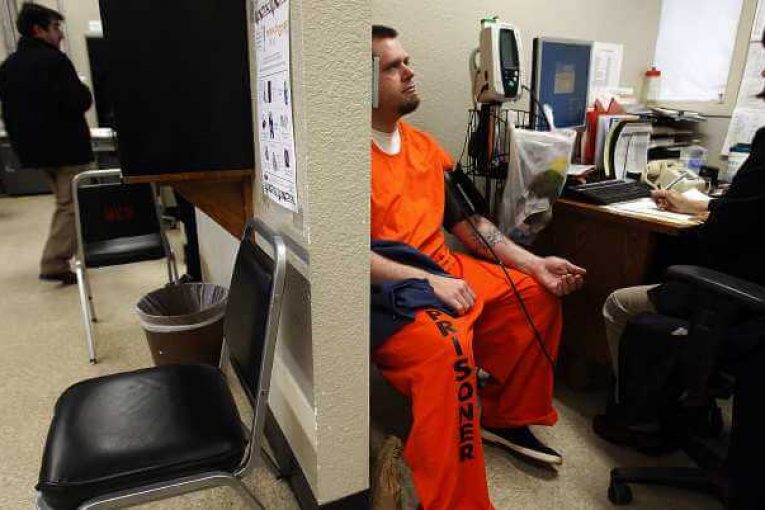

By The Vanguard Staff
ANGOLA, LA – The Louisiana State Penitentiary here is continuing to violate inmates’ constitutional rights by systematically ignoring their medical needs — despite the court’s ruling officials must fix the problem —so a federal court has ordered federal oversight of the facility this week.
Three “special masters” will develop remedial plans to address the violations and monitor whether they are being followed, court records show, according to a story in Nola.com.
“It is only the latest time in the past few decades when U.S. courts and federal civil rights investigators have directly intervened at Louisiana’s infamous high-security prison, which has been at the center of a multitude of lawsuits and sharply critical reports by outside agencies,” noted Nola.
The 104-page opinion by U.S. District Judge Shelly Dick criticized prison officials for “the callous and wanton disregard for the medical care of inmates at Angola,” noting the prison had been the subject of criticism regarding inmate health care since at least 1989.
“Dick’s ruling describes inmates dying of preventable diseases and suffering pain from treatable illnesses while staff refused treatment or ignored symptoms,” wrote Nola.com, quoting the judge as stating, “The human cost…is unspeakable. The finding is that the ‘care’ is not care at all, but abhorrent cruel and unusual punishment that violates the United States Constitution.”
The prison said it plans to appeal the judge’s ruling.
None of this is new to the court, as Nola.com explained, writing in 2021, “Dick ruled corrections officials had been ‘deliberately indifferent’ to the medical needs of Angola inmates. She found that inmate access to health care is unconstitutionally inadequate in the areas of clinical care, specialty care, infirmary care and emergency care.”
Lawyers for those incarcerated at Angola argued in a two-week remedy trial that little had changed a year later, stating the prison “made some changes during the pendency of this litigation,” but “defends its health care system and denies that it was constitutionally deficient at any time,” the judge said this week.
Nola.com wrote the judge has deemed injunctive relief necessary.
“Your humanity does not stop at the prison gate,” said Mercedes Montagnes, who was the lead attorney for the plaintiffs at the time of trial. “This Court’s ruling underscores the value in every life and holds our state accountable for its failure to protect patients.”
Dick ruled in 2021 that Angola’s medical care violates the Constitution, and as Nola.com reports, the judge found the state still culpable of violating incarcerated rights.
Now, reviewing a fresh sample of inmates’ cases, Dick has found the state is still violating their rights.
Nola.com cited several cases of neglect in the prison, including a “50-year-old man made seven requests—all unanswered—for medical attention for escalating back pain. When medics finally evaluated him, he was found lying on the floor, the opinion says, and died within hours after seeing a doctor. His autopsy showed he was suffering from a large liver abscess and resulting spinal cord compression.”
In another case, an incarcerated “experienced two years of abdominal pain and weight loss, which were ignored and untreated, the opinion says. He was ultimately hospitalized and diagnosed with advanced stage colon cancer, leading to ‘a preventable death.’”
And, another case presented to the court cited a 65-year-old man with a “history of diabetes, severe coronary artery disease and heart failure who showed dangerous symptoms seven times in one month: fevers as high as 103.6 degrees, an altered mental state and complaints of chest tightness…he was confined to a ‘locked room’ in the infirmary at one point and was not seen by a doctor for three days…Angola doctors ordered EMTs not to take the man to the hospital; he died in his cell the next day.”
Jeffrey Dubner, legal director for Democracy Forward and co-lead counsel for the plaintiffs, excoriated officials, said the Nola.com story, for taking so long to fix known problems while people “suffered needlessly from treatable conditions…This ruling is a win for the rule of law, an important step toward ensuring constitutional care for all those imprisoned in Angola.”
Angola has a long history of federal intervention in its health care system, said Nola, noting, “Back in 1971, a special master was appointed over a lawsuit filed by Angola inmate Hayes Williams alleging poor prison conditions, including inadequate medical care.”
The three special masters will include a physician, a nurse or nurse practitioner and someone with knowledge and expertise in handicap and disability access and accommodations, according to Dick’s remedial order.
Nola.com wrote “In addition to appointing three special masters, the order requires a remedial plan for the prison to include a medical care plan and an Americans with Disabilities Act plan, with strict guidelines on cooperation giving the special masters extensive access to the prison’s records.”
Samantha Bosalavage, a staff attorney at the Promise of Justice Initiative and counsel on the case, said in a statement that it has taken eight long years to find relief for her clients.
“The Court has set out a clear and logical path to remedying the violations, and our clients look forward to finally receiving the health care to which they have always been entitled,” she said. “This legal victory validates the humanity of the thousands of incarcerated men at Angola.”